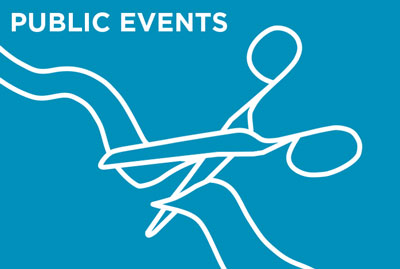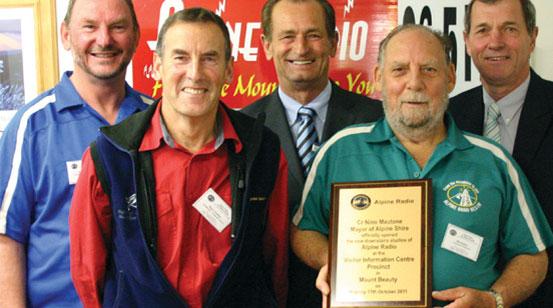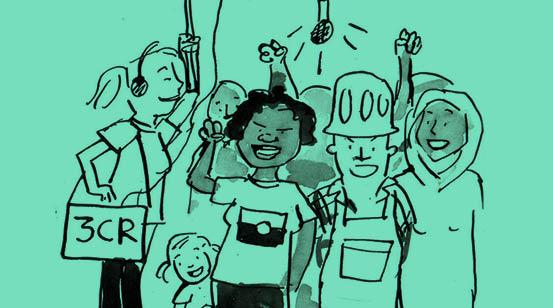Tools of Engagement
Like with most other campaigns, a successful political engagement campaign will combine a variety of different strategies.
Some will involve direct engagement, others will be more indirect, but by combining a variety of different strategies you will ensure that your political engagement strategy has the best chance to build a relationship between you and your representatives that benefits both your station and the community.
It’s all about choosing which method is the most appropriate on which occasion.
In this section are a series of tactics you can use to engage with politicians.
 Face-to-face meetings are a good way to introduce politicians to yourself, the station and your needs.
Face-to-face meetings are a good way to introduce politicians to yourself, the station and your needs.
-
Plan to meet local politicians regularly. Once a year would be ideal.
-
At the station is the ideal location, providing numerous secondary opportunities, for example for photographs and engaging online and traditional media. However, the politician’s office will be most convenient for them, and can be more suitable for some types of request.
-
Keep it brief. Politicians are often over-scheduled. Aim to have said everything that needs saying within 30 minutes.
-
Know what you want in advance. Meeting for a general chit-chat is counterproductive.
-
Follow-up 1-2 days later with an email, thanking them for the meeting and alluding to any promises or commitments that were made.
-
Take along key materials, e.g. a one page primer about your station and Factsheets A and B of this toolkit.
-
Be prepared for occasional last-minute cancelations or delays.
 On air is the most obvious way for politicians to engage with your station, and a starting point for a strong relationship.
On air is the most obvious way for politicians to engage with your station, and a starting point for a strong relationship.
-
An ideal situation would be having your chosen politician come in or phone in periodically to chat about what’s been going on in parliament or on council and take calls from listeners.
-
Politicians with hobbies or special interests may enjoy appearing on air and NOT talking politics; instead talking about music, sport, literature or something else.
-
When politicians are chasing media on particular issues they may be able to provide news grabs or give a short interview.
-
Indirectly, reading portions of politicians’ media releases or updating on their activities on air can help encourage them to appear at some point in the future.
-
After politicians appear onair, follow up with a thank you message and relay any positive feedback you have received.
-
Try and book the next appearance immediately post-encounter, or at least get a commitment for another appearance soon.

Whether you’re hosting, attending or covering an event, make sure to touch base with any politicians there.
-
At an event you are both attending, make sure you go up and ‘touch base’ with the politician. Have in mind a few things to refer to, e.g. a reference to your last interaction (to jog their memory), mention of something they’ve been doing in their job (to acknowledge the work they do) and an invitation to engage at some point in the future. Don’t try and monopolise their time. Everyone will want a piece. Follow-up 1-2 days later.
-
At an event you are covering, record some of their content. This could be news-grab style, where they promote, reflect on or praise the event. If they give a speech, record it. Even if it’s not broadcasted, it can make good online content. If a council or political media adviser is doing their job correctly, they will be trying to get two bites of the media cherry out of events. The first is the lead up, the second in the reporting. If you notice your local politician isn’t doing this, you might need to become a little more proactive.
-
At an event you are hosting, try and give them a job to do, e.g. being the MC or an auctioneer. At the very least, acknowledge their presence and thank them publicly for attending.

The Internet and online communication tools present a number of opportunities for political engagement.
-
Maximise your use of communications channels to both engage with and keep up to date with relevant politicians. Ensure you are ‘liking’ and ‘following’ their social media channels. Sign up to their e-newsletter.
-
Engage with their communications channels: liking, sharing and redistributing their content where appropriate.
-
Ping or reference politicians when you do relevant online communications, and sign them up to your e-newsletter if you have one.
-
During station promotion periods, ask politicians to share your online campaign collateral via their communications channels.
-
Set up a Google Alert or some other kind of monitoring, so that you keep up to date with your chosen representatives’ media appearances.
-
Download a factsheet with tips about improving your online communications tools.

Despite the digital age, television, newspapers and commercial radio remain important news sources.
-
Due to its nature, community radio can straddle the line between news-outlet and news-item. Turn political engagement into a traditional media opportunity. For example, a politician’s station visit could be a good opportunity to get local or specialist paper to write up a station profile, with a great picture of you and the politician, of course!
-
Make sure you are on the list to receive politicians’ media releases.
-
Politicians’ media appearances can also become content for you to use, even if you don’t talk to them yourself. For example, an opinion piece by a politician often gets plenty of bounce across multiple news outlets.
-
Build relationships with your local newspapers, TV stations and other outlets. Pitch stories to them where appropriate.
-
Download a factsheet with tips about better understanding and utilising traditional media.
 Politicians can benefit community radio stations financially both directly and indirectly.
Politicians can benefit community radio stations financially both directly and indirectly.
-
Directly engage politicians in your fundraising activities.
-
Ask them to share your campaign materials with your networks, appear at events, in promotional material and donate money (of course).
-
If you have more than one politician who is willing to engage constructively, plan a variety of different activities rather than having them all make a ten-minute speech at your annual fundraising dinner. This can not only avoid potentially awkward situations involving political or personal incompatibility (or both), it also acknowledges that different politicians have different audiences that they appeal to and can attract to your station.
-
Make sure your local politicians are aware of any sponsorship opportunities they can take advantage of, for example to advertise community engagement forums.
 Direct emails and letters remain the next most effective communication forms after face-to-face conversations and the telephone.
Direct emails and letters remain the next most effective communication forms after face-to-face conversations and the telephone.
-
It’s good to get in the habit of both snail- and e-mailing politicians.
-
In written correspondence, keep the tone appropriate to the message you’re trying to convey, rather than the relationship you personally have with them.
-
If the politician has appeared on air or visited the station for the first time, send a follow up email a day or two later, thanking them for coming on and alluding to some kind of future contact.
-
If a politician has participated in a fundraising drive or MC’d a station event, send a short formal letter on letterhead thanking them for their involvement and their support.
-
Make sure you’re on the mailing list for any hardcopy materials that come out of the politicians’ office, and send them yours. Update them on station milestones and other significant activities formally.
-
Depending on your relationship, if you see the politician do something good, send them a quick (i.e. short) email congratulating them for it.
READ MORE
Partisan politics can be a vicious business and stations are right to tread carefully.
Done successfully, political engagement will strengthen the connection of your station to the communities you broadcast to.




